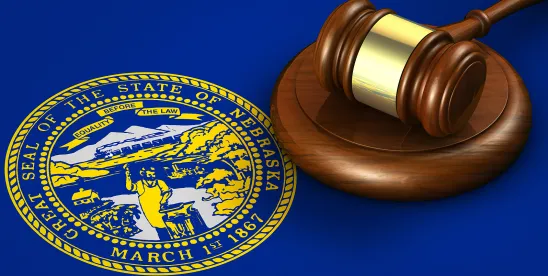On June 5, 2025, Nebraska Governor Jim Pillen signed Legislative Bill (LB) No. 415 that clarifies and amends the Nebraska Healthy Families and Workplace Act (NHFWA) passed by voters in November 2024, which provides earned paid sick time (PST) to most Nebraska employees. The bill will become effective in time for the October 1, 2025, start date for the state’s PST requirement under the NHFWA.
Quick Hits
- The Nebraska Healthy Families and Workplace Act requires most Nebraska employers to provide earned paid sick time, starting October 1, 2025.
- On June 5, 2025, Nebraska Governor Pillen signed a bill that clarifies and amends the Nebraska Healthy Families and Workplace Act.
On November 5, 2024, Nebraska voters overwhelmingly approved Nebraska Initiative 436 (also known as the Healthy Families and Workplace Act), which requires employers to begin providing earned paid sick time (PST) to most Nebraska employees on October 1, 2025. On May 28, 2025, the Nebraska Legislature passed Nebraska LB No. 415, which clarifies and amends the NHFWA.
The Amended Nebraska Healthy Families and Workplace Act
Under the NHFWA, most Nebraska employers must provide earned paid sick time to employees starting October 1, 2025. The law exempts employers that are federal or state governments or political subdivisions of the state.
Under the NHFWA, employees earn one hour of paid sick time for every thirty hours worked. Employers with twenty or more employees can cap accrual and use of PST at fifty-six hours per year. Small employers (defined by the amendment to include employers with eleven to nineteen employees) can cap accrual and use at forty hours each year. Employees can carry over all unused PST at the end of the year, but carryover does not affect the annual accrual and use caps that are based on employer size.
LB-415 clarifies and amends the NHFWA as follows:
- Exempt Employees. Seasonal and temporary workers employed in agriculture and employees under age sixteen are not eligible to earn PST.
- Small Employers Exempt. Small employers with fewer than eleven employees do not have to provide PST.
- Waiting Period for Accrual. Employees begin earning PST after working eighty consecutive hours in Nebraska, but employees can use PST as it accrues.
- Existing Paid Time Off Policy. Employers are not required to provide additional paid time off under the law if they have a paid leave policy that meets the following requirements: the policy permits employees to take paid leave in an amount that equals or exceeds what is required by the NHFWA and that can be used as paid sick time. Employers are not required to allow accrual or carryover beyond their existing paid time off policies.
- Paid Leave Provided Between January 1, 2025 – September 30, 2025. Paid time off provided by an employer on or after January 1, 2025, that can be used for the reasons covered by the law will be counted toward the employer’s annual obligations to provide PST in 2025.
- Payout of Unused PST. The law does not require employers to pay out unused PST at the time of separation.
- No Private Right of Action. Employees do not have a private right of action under the law.
The amendment did not change most other key provisions of the NHFWA including:
- Carryover. Employees may carry over all unused PST, but carryover does not affect applicable accrual and use caps based on employer size. An employer may avoid carryover by paying out all unused PST at yearend and frontloading the employee’s annual allotment of PST at the beginning of the subsequent year.
- Rate of Pay. Employers must pay PST at the employee’s normal hourly rate and with the same benefits, including healthcare benefits and accrual of paid time off (including accrual of PST).
- Reasons for Use. Employees may use PST for (1) their own or a family member’s mental or physical illness, injury, or health condition; or (2) closure of the employee’s place of business or child’s school due to a public health emergency.
- Notice of Use. An employer requiring notice of use of PST must have a written policy outlining a reasonable procedure for providing notice.
- Increments of Use. Employees may use PST in the smaller of one-hour increments or the smallest increment of time used to account for other types of absences.
- Documentation. Employers can request documentation to support PST use when an employee uses PST for more than three consecutive days.
- Administrative Penalties. Employers that violate the NHFWA can be subject to administrative penalties of up to $500 for a first violation and up to $5,000 in the case of a second or subsequent violation. An employer with an unpaid citation is not eligible to contract with the state until the citation is paid.
Employers must provide written notice of the NHFWA by September 15, 2025, and display a poster at the employer’s worksite thereafter. Employers can provide electronic notice to remote workers or if the employer does not maintain a physical worksite. Current employees who have worked at least eighty hours in Nebraska will begin earning PST on October 1, 2025. All other Nebraska employees will start earning PST once they have worked at least eighty hours in the state. The Nebraska Department of Labor issued guidance in the form of frequently asked questions (FAQs), which should be updated to incorporate updated guidance following the passage of LB-415.
Key Takeaways
Starting October 1, 2025, most Nebraska employers must allow employees who have worked at least eighty hours to start earning paid sick time at a rate of one hour for every thirty hours worked. Employers with fewer than eleven employees are exempt from the law. Employers with eleven to nineteen employees can cap accrual and use at forty hours per year. Employers with twenty or more employees can cap accrual and use at fifty-six hours per year. Employers with an existing paid leave policy need not provide additional paid leave under the NHFWA if the policy provides an amount of leave equal to or greater than that required by the law, and which can be used as paid sick time. Employers can count paid leave that was provided to employees between January 1, 2025, and September 30, 2025, toward their annual obligation for PST if the paid time off was available for use as paid sick time as provided by the NHFWA.




 />i
/>i

